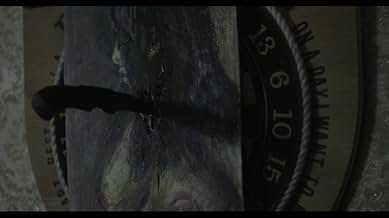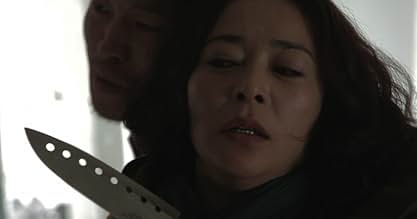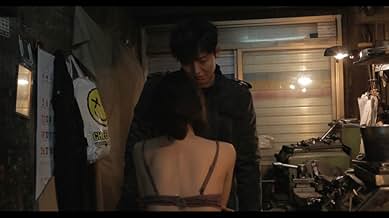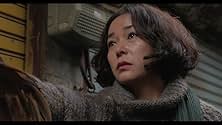A loan shark is forced to reconsider his violent lifestyle after the arrival of a mysterious woman claiming to be his long-lost mother.A loan shark is forced to reconsider his violent lifestyle after the arrival of a mysterious woman claiming to be his long-lost mother.A loan shark is forced to reconsider his violent lifestyle after the arrival of a mysterious woman claiming to be his long-lost mother.
- Awards
- 25 wins & 30 nominations total
Lee Jung-Jin
- Gang-Do
- (as Jeong-jin Lee)
Woo Ki-hong
- Hoon-chul
- (as Ki-Hong Woo)
Cho Jae-ryong
- Tae-seung
- (as Jae-ryong Cho)
Heo Joon-seok
- Suicidal Man
- (as Jun-seok Heo)
Yu Ha-bok
- Container man
- (as Ha-bok Yu)
- Director
- Writer
- All cast & crew
- Production, box office & more at IMDbPro
7.116.5K
1
2
3
4
5
6
7
8
9
10
Featured reviews
Love can melt a cruel person
Korean thriller movies always surpries me with it's ending. We get through one concept and it turns to be another. While I was watching this, I thought it is a story of mother and son who were somehow separated. But the movie proves me wrong. Its not about the separation and reunion of mother son its about untold revenge.
Disturbing retelling of grief and Greek Tragedy
- Review originally posted at The Frame Loop. Visit www.theframeloop.com -
Even before the first image of an ominously hanging, rusty hook, Pieta comes to CPH PIX Film Festival with a great deal of infamy. The latest from South Korean, art-house provocateur Kim Ki Duk (3-Iron, The Isle) this unnerving revenge drama wowed last year's Venice Film Festival jury so much that it went on to beat Paul Thomas Anderson's The Master to the coveted Golden Lion award. Is it a better film than that aptly titled PTA project? Absolutely not. Is Pieta a gritty, harrowing and wholly engrossing exercise in cinematic tolerance? You're damn right it is.
Li Jung-Jin stars as Kang-Do, the merciless henchman to a crooked Seoul loan shark. Living in a threadbare apartment, with a diet consisting of half-cooked meat, he scuttles across the city, ruffling up people's feathers and making sure they pay up their debts, or else suffer the brutal consequences. His lonesome, pitiful existence is transformed by the arrival of Mi-Sun (Jo Min-Soo), an elderly woman claiming to be his estranged mother. Seeking repentance and the love of the inhumane monster she birthed and abandoned, the disbelieving Kang-Do puts her through a slew of horrific tests that will prove their bloodline, from eating dismembered body parts, to unsolicited incest. Boundaries are crossed, taboos busted open, and a repugnant relationship ensues.
Despite the industrial slum setting and the subtext of tooth/limbless capitalism, Pieta conforms to a typical Greek tragedy plot line. With each revelation more traumatic and sickening than the last, Kim tells the story with brute emotional force and savagery, without ever resorting to the ultra-violence made so common in South Korean cinema from the likes of Park Chan-Wook and The Vengeance Trilogy. While Jo Young-Jik's curious hand-held cinematography may look away from the most distressing of graphic acts, the pain lingers on the screen through Li and Jo's fantastic, expressionistic acting. The pair have a terse, inflammatory chemistry which is so enthralling that the mother-son relationship is all the more sickening.
Perhaps the film's success in Europe isn't all that surprising. Tackling the cruel storyline through emotional heft – without the archetypal glossy production values of the region - Pieta could be mistaken for a Lars von Trier or Gaspar Noé project. With a sublime first act, Kim gets lost in the knotty narrative he has laid out before him, and ties everything up in a stirring denouement that brings some genuine heart to the otherwise pitiful portrait of dog-eat-dog, Seoul city-living.
In that brilliant opening third, Mi-Sun turns to Kang-Do to denounce money as the 'beginning and the end of all things: love, honour, violence, fury, hatred, jealousy, revenge, death.' Unsavoury topics abound, Kim Ki-Duk combats them all with severe conviction in Pieta. If you can stomach such callousness, then this is diatribe is well worth a watch.
- Review originally posted at The Frame Loop. Visit www.theframeloop.com -
The director's darkest yet
As a massive fan of Korean director Kim Ki-duk - I've never seen a film of his I haven't loved - I was eager to see what delights his new film PIETA had in store for the viewer. In some ways it's similar to a lot of his previous filmography, like BAD GUY, in which the protagonist is also the antagonist, and also similar to other Korean films I've seen like BREATHLESS.
The main character is a ruthless loan shark who makes a living from crippling those who owe him money; he gets the money back from their insurance claims. The glacial Lee Jeong-jin gives an icy turn as a truly horrible creation, but inevitably he thaws a little once you get to know him, and once the plot kicks in. This is a revenge story, but one done in a way that's both subtle and convoluted; it's a film that rewards close attention, else you won't have a clue what's going on.
Jo Min-soo bags the film's most interesting role of the long-lost mother who turns up seeking reconciliation. It's a difficult, unsympathetic part to play, and there are one or two sexual situations which go way beyond the realms of bad taste into some of the most disgusting things I've ever seen. As ever, though PIETA isn't really an explicit film, despite the sheer quantity of violent incidents that happen during the running time, and as a story it gets more and more engrossing as it goes on. The end is particularly profound, and the lush cinematography on a tiny budget makes this a beautiful film to watch, despite the depravity.
The main character is a ruthless loan shark who makes a living from crippling those who owe him money; he gets the money back from their insurance claims. The glacial Lee Jeong-jin gives an icy turn as a truly horrible creation, but inevitably he thaws a little once you get to know him, and once the plot kicks in. This is a revenge story, but one done in a way that's both subtle and convoluted; it's a film that rewards close attention, else you won't have a clue what's going on.
Jo Min-soo bags the film's most interesting role of the long-lost mother who turns up seeking reconciliation. It's a difficult, unsympathetic part to play, and there are one or two sexual situations which go way beyond the realms of bad taste into some of the most disgusting things I've ever seen. As ever, though PIETA isn't really an explicit film, despite the sheer quantity of violent incidents that happen during the running time, and as a story it gets more and more engrossing as it goes on. The end is particularly profound, and the lush cinematography on a tiny budget makes this a beautiful film to watch, despite the depravity.
Pieta at the Venice Film Festival
Directed by Kim Ki-duk
Pieta is director Kim Ki-duk's eighteenth movie. When this fact appeared on the screen, a spontaneous applause erupted. Hugely under-appreciated at home, Kim Ki-duk is well-known beyond the borders of his country South-Korea. He does not conform to any rules, doesn't avoid sensitive subjects, and shows the harshness of life without any scruples, political, humanistic and in a very physical confronting approach. It is true that his films are usually not an easy watch; they certainly do not conform to idea that film equals entertainment. The free thinking soul will see that Kim Ki-duk's movies are not made to shock the audience just for the sake of it, but to show the thoughts of a brave artist, who exhibits a rare vulnerability and a frightening honesty in his approach to his subjects.
Actress Cho Min-soo who portrays the character Mi-son in the movie declares during the press conference: "His films are eyes to reality." Apparently she and Lee Jung-Jin, who brilliantly plays main character Gang-Do, barely knew who Kim Ki-duk was when they were asked to play the parts. They tell the press that during the process of making the movie they learned to act in a completely different way.
Made with a budget that is just a fraction of Korean film budgets these days, outsider Pieta entices the jury and the public, and makes a far more lasting impression than other more obvious candidates like "To the Wonder,""At any price" and "Fill the void." Even though malicious rumors say that the jury wanted to award "The Master" all the big prizes, Kim's film is rightfully the recipient of the Golden Lion. Accepting the prize, Kim thanked the actors, staff, film festival officials and Italian fans before bursting into a traditional Korean song.
The story of the film is about lone wolf, self-absorbed: masturbating, crazy moralless man who lends money to desperate workers of the industrial slum of Cheonggyecheon. He charges ten times the borrowed sum in interest. If his clients don't pay up, Gang-do cripples them, taking the insurance payments on their injuries to make up for the difference. His character is a metaphor for extreme capitalism. Kim commented: "...but not the money itself, you can change the face of money. Money is the third character."
Then a women shows up at his doorstep, claiming to be the mother who abandoned him as a baby. He tests her in some gruesome ways, before he acknowledges her presence and even begins to show signs of affection towards her. Mi-son also proves herself to him by being just as ruthless as him. They form a frightful but also strangely intriguing duo. The grim story finds some more breathing space for the audience towards the end, but a bitter aftertaste remains.
What makes Kim Ki-duk an excellent storyteller is that most of the graphic cruelty is not shown, but actually takes place in the viewer's imagination. He is able to show real life images that can represent abstract ideas. He can make an audience relate to his characters even though they are immoral and almost heartless human beings, doing this with so much ease is remarkable. It is a rare quality to be able to find beauty in the most harsh places and to somehow convey this strange beauty to the screen. To make you believe in the story, without realizing it is perhaps an absurd one. And maybe most important: to make the viewer emotionally gripped, while talking about universal human issues, emotions and ideas even though there are cultural differences that separate audience and filmmaker. Kim Ki-duk: "(Pieta is) an embrace to the whole of humanity. The movie is dedicated to humankind."
Pieta is director Kim Ki-duk's eighteenth movie. When this fact appeared on the screen, a spontaneous applause erupted. Hugely under-appreciated at home, Kim Ki-duk is well-known beyond the borders of his country South-Korea. He does not conform to any rules, doesn't avoid sensitive subjects, and shows the harshness of life without any scruples, political, humanistic and in a very physical confronting approach. It is true that his films are usually not an easy watch; they certainly do not conform to idea that film equals entertainment. The free thinking soul will see that Kim Ki-duk's movies are not made to shock the audience just for the sake of it, but to show the thoughts of a brave artist, who exhibits a rare vulnerability and a frightening honesty in his approach to his subjects.
Actress Cho Min-soo who portrays the character Mi-son in the movie declares during the press conference: "His films are eyes to reality." Apparently she and Lee Jung-Jin, who brilliantly plays main character Gang-Do, barely knew who Kim Ki-duk was when they were asked to play the parts. They tell the press that during the process of making the movie they learned to act in a completely different way.
Made with a budget that is just a fraction of Korean film budgets these days, outsider Pieta entices the jury and the public, and makes a far more lasting impression than other more obvious candidates like "To the Wonder,""At any price" and "Fill the void." Even though malicious rumors say that the jury wanted to award "The Master" all the big prizes, Kim's film is rightfully the recipient of the Golden Lion. Accepting the prize, Kim thanked the actors, staff, film festival officials and Italian fans before bursting into a traditional Korean song.
The story of the film is about lone wolf, self-absorbed: masturbating, crazy moralless man who lends money to desperate workers of the industrial slum of Cheonggyecheon. He charges ten times the borrowed sum in interest. If his clients don't pay up, Gang-do cripples them, taking the insurance payments on their injuries to make up for the difference. His character is a metaphor for extreme capitalism. Kim commented: "...but not the money itself, you can change the face of money. Money is the third character."
Then a women shows up at his doorstep, claiming to be the mother who abandoned him as a baby. He tests her in some gruesome ways, before he acknowledges her presence and even begins to show signs of affection towards her. Mi-son also proves herself to him by being just as ruthless as him. They form a frightful but also strangely intriguing duo. The grim story finds some more breathing space for the audience towards the end, but a bitter aftertaste remains.
What makes Kim Ki-duk an excellent storyteller is that most of the graphic cruelty is not shown, but actually takes place in the viewer's imagination. He is able to show real life images that can represent abstract ideas. He can make an audience relate to his characters even though they are immoral and almost heartless human beings, doing this with so much ease is remarkable. It is a rare quality to be able to find beauty in the most harsh places and to somehow convey this strange beauty to the screen. To make you believe in the story, without realizing it is perhaps an absurd one. And maybe most important: to make the viewer emotionally gripped, while talking about universal human issues, emotions and ideas even though there are cultural differences that separate audience and filmmaker. Kim Ki-duk: "(Pieta is) an embrace to the whole of humanity. The movie is dedicated to humankind."
A Tragic Story of Love, Loss, Revenge & Redemption.
The 18th feature film written & directed by Korean cinema's most notorious filmmaker, Pietà tells the story of a sadistic loan shark who ends up crippling people for not paying their debts, which after added interest is 10 times the amount they borrowed. Torturing with no feelings, his life takes a changing course when a middle-aged woman claiming to be his long lost mother comes into his life out of nowhere.
The film has all the disturbing elements one expects from Kim Ki-duk and although the first half has no easy-to-digest moments, the second half plays out very well to end on a satisfying, even rewarding, note. Cinematography reflects the appalling nature of the subject matter while editing presents a well-sought balance. The performances are pretty impressive from its two leads & the rest of filmmaking aspects are finely executed as well.
On an overall scale, Pietà is a highly tragic story of love, loss, revenge & redemption that has much more to offer than just disgust its viewers. Sure, Kim Ki-duk takes extreme pleasure in making his audience flinch but he also backs it up with enough justifications for the violence in his films. Shocking, unnerving, pitiful, haunting & infused with Christian symbolisms, Pietà is an unsettling psychological study of a mother-son relationship that also presents a fascinating take on what famously is Korean cinema's favourite genre.
The film has all the disturbing elements one expects from Kim Ki-duk and although the first half has no easy-to-digest moments, the second half plays out very well to end on a satisfying, even rewarding, note. Cinematography reflects the appalling nature of the subject matter while editing presents a well-sought balance. The performances are pretty impressive from its two leads & the rest of filmmaking aspects are finely executed as well.
On an overall scale, Pietà is a highly tragic story of love, loss, revenge & redemption that has much more to offer than just disgust its viewers. Sure, Kim Ki-duk takes extreme pleasure in making his audience flinch but he also backs it up with enough justifications for the violence in his films. Shocking, unnerving, pitiful, haunting & infused with Christian symbolisms, Pietà is an unsettling psychological study of a mother-son relationship that also presents a fascinating take on what famously is Korean cinema's favourite genre.
Did you know
- TriviaShot digitally on two Canon EOS 5D Mark II DSLR cameras. The director operated one of the cameras himself.
- ConnectionsFeatured in At the Movies: Venice Film Festival 2012 (2012)
- How long is Pieta?Powered by Alexa
Details
Box office
- Budget
- €103,000 (estimated)
- Gross US & Canada
- $22,080
- Opening weekend US & Canada
- $6,222
- May 19, 2013
- Gross worldwide
- $6,616,296
- Runtime
- 1h 43m(103 min)
- Color
- Sound mix
- Aspect ratio
- 1.85 : 1
Contribute to this page
Suggest an edit or add missing content

































